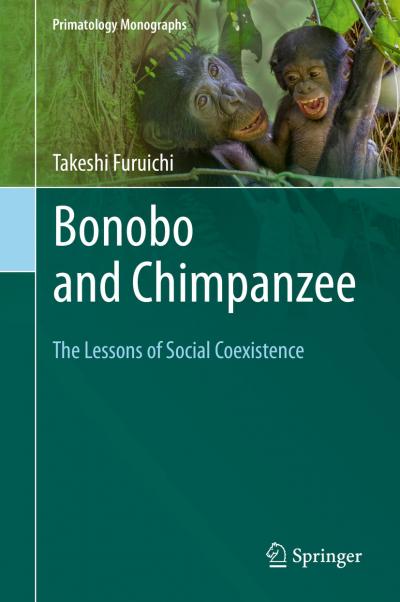A personal account of bonobo and chimpanzee behaviour by a renowned Japanese primatologist explains what and why we should learn from our closest relatives

Credit: Springer Nature
Those who are not familiar with bonobos and chimpanzees may have trouble telling the two species apart: they look alike and they live in similar habitats. In fact, it wasn’t until 90 years ago that experts realised that bonobos and chimpanzees were different species. In his book, Bonobo and Chimpanzee, Takeshi Furuichi describes his observations of both species’ behaviour while drawing parallels between humans, bonobos and chimpanzees in an attempt to find solutions for the peaceful coexistence of human beings.
Over five chapters, Furuichi – who is one of the only primatologists to have studied both bonobos and chimpanzees in the wild for nearly three decades – describes many different aspects of their behaviour. Furuichi outlines in detail what a typical day for a bonobo may involve, he describes the sexual mechanisms of bonobos, he also addresses male competition in chimpanzees, and inter-group wars in both species. Furuichi punctuates his observation of primates with insight into the human communities who live close to bonobo populations in the Democratic Republic of the Congo. Throughout the book he provides snippets of analysis of human behaviour and he questions the way modern humans live now, and what this means for our and the planet’s future.
Furuichi explains, for example, that bonobos usually only spend around three hours a day “working” (foraging for food, making their beds) while the rest of their time is spent sleeping, relaxing and playing. This, observes Furuichi, is far removed from the lives most people in developed countries now lead. In another example, Furuichi explains how female-led societies – as seen in the social structures of bonobo groups – could result in a rise of female leaders who advocate peace rather than conflict.
Bonobo and Chimpanzee draws on knowledge from anthropology, evolutionary biology and psychology, but is written in a highly accessible and entertaining way; scientific explanation is interspersed with Furuichi’s personal anecdotes. With over 60 colour illustrations, this unusual blend of facts, scientific research and highly personal accounts makes Bonobo and Chimpanzee an appealing and fascinating read for anyone interested in animal behaviour and the role humans play in the natural world. Through his book, Furuichi essentially asks the question: are we really as intelligent as we think we are?
###
About the author
Takeshi Furuichi is professor at the Primate Research Institute, Kyoto University, Japan. He has been studying bonobos in the Democratic Republic of the Congo and chimpanzees in Uganda for more than 35 years. His main interests are in the sexual behaviors and life histories of females and he also studies the evolutionary process of early humans, collaborating with researchers working on human fossils and hunter-gatherers.
Furuichi, Takeshi
Bonobo and Chimpanzee
2019, 147 p. 65 illus.
Softcover 29,99 € | £24.99 | $37.99 |
ISBN 978-981-13-8058-7
Also available as an eBook
Media Contact
Elizabeth Hawkins
[email protected]
49-622-148-78130
Original Source
https:/




